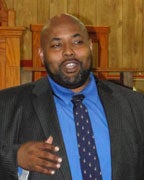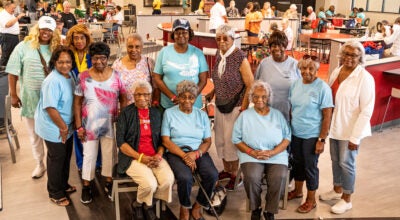Voting rights march planned for this summer
Published 10:29 am Tuesday, March 10, 2015
By EMILY SPARACINO / Staff Writer
Fifty years and much legislation have passed since civil rights activists met violence on their “Bloody Sunday” march from Selma to Montgomery in 1965, and campaigns for equal voting rights in the United States continue today.
As U.S. President Barack Obama joined thousands of people in Selma last weekend to observe the 50th anniversary of Bloody Sunday, the Rev. Kenneth Dukes, president of the Shelby County NAACP branch, noted the relevance the event still holds for him and others in Shelby County and across the country.

The Rev. Kenneth Dukes, president of the Shelby County Chapter of the NAACP, is helping organize a march this summer to mark the two-year anniversary of the U.S. Supreme Court’s ruling in Shelby County v. Holder concerning the Voting Rights Act of 1965. (File)
“I think the majority of people that spoke were talking about how it’s no longer a celebration of what we gained, but it’s a sad moment of reflecting on what we lost,” Dukes said in a March 9 phone interview. “It was mixed emotion.”
Dukes is chairman of a committee organizing a march this summer to mark the two-year anniversary of the U.S. Supreme Court’s Shelby County v. Holder ruling striking down the preclearance provision of the Voting Rights Act of 1965.
“We’re in the preliminary stages of something … to commemorate that ruling,” Dukes said. “We have progress. You have to have progress, yes, but is there still forms of disenfranchisement when it comes to voting? We feel like there is.”
The preclearance provision required Shelby County and cities and counties in 16 states with histories of racial discrimination to obtain federal approval from the Department of Justice before changing voting procedures or electoral maps.
In 2006, Congress voted to extend Section 5 for 25 more years. Two years later, the city of Calera redrew its voting districts without getting U.S. Department of Justice clearance before holding city council elections. The new voting districts eliminated the only black-majority voting district, and Councilman Ernest Montgomery, a black man, lost his seat by a handful votes. The federal government refused to certify the results, and Montgomery won a seat on the council after the city held another election.
In 2010, Shelby County challenged the constitutionality of sections 4b and 5 of the Voting Rights Act, arguing that progress had been made since the act went into effect. The Supreme Court’s final ruling on the challenge in June 2013 capped off a three-year process.
“It’s not just a Shelby County issue, it’s a national issue,” Dukes said. “Fifty years ago, we were marching. We’re still marching.”
Dukes said the commemorative march would likely occur in June in Columbiana, but the date, time and other arrangements have not been solidified yet.
“I love Shelby County. Shelby County is a wonderful place to live,” Dukes said. “I think there are a few views that affect the whole nation.”









